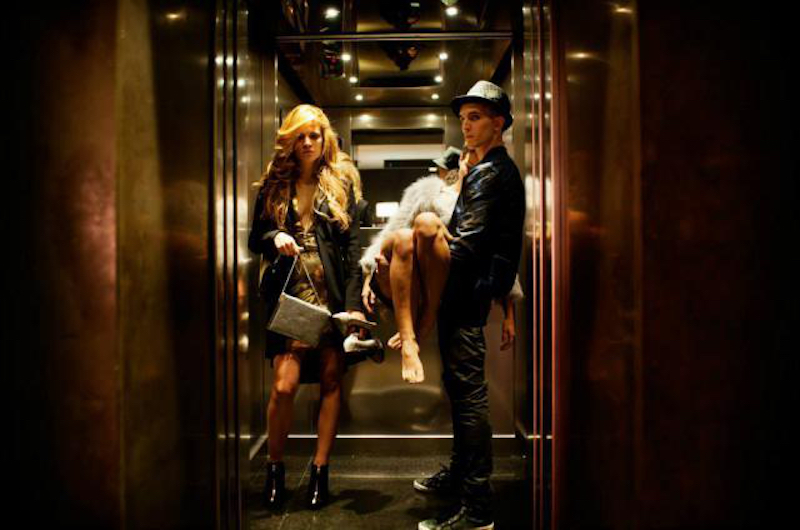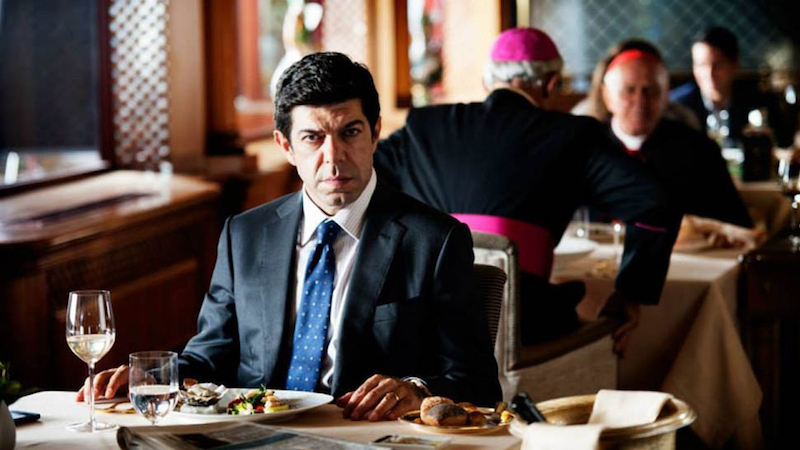Notes on Blindness is an extraordinary film that wears its original genius lightly. The debut full-length documentary from directors Peter Middleton and James Spinney, it may seem complicated in its assembly, but has a final impact that is luminously simple. And to speak of a film whose immediate subject is the loss of sight – and by extension, of the visual element that comprises cinema itself – in terms of luminousness is finally no paradox at all.

The last film to feature the Chilean coup was No from 2012, which explored the referendum that finally rid the country of General Pinochet and returned the country to democracy. There a genius adman plotted a brilliant campaign to get the right answer. Perhaps worthwhile viewing for those planning referendums?

There are often times as adults, that we feel ill-prepared for dealing with situations that arise. There is no equivalent of a Brownie’s badge for “taking responsibility” “progressing the career ladder”, “finding your life partner” or “coping with grief”. But by age 30, somehow, inexplicably, we’re supposed to have it all under control. Rachel Tunnard’s debut feature film departs from this social norm, and takes a look at what happens when the dream is derailed.

Shamed and reviled, Richard Nixon had the misfortune (albeit self-authored) to be the star of one of the murkiest chapters in American Presidential history. It's not much compensation for him now, but he has become something of a goldmine for film-makers.

Susan Sarandon's natural radiance papers over a considerable number of cracks in The Meddler, writer-director Lorene Scafaria's loving, largely autobiographical tribute to the kind of mum you might want on occasion to throttle but in the end adore beyond all words.

An underage prostitute dies from a drug overdose at a mini “bunga bunga” party with a high-ranking politician. When that’s one of a film’s less shocking moments, you know you’re in for a bumpy ride.
With its steady stream of killings, maimings, kidnap and a frothing-mouthed killer canine, Stefano Sollima’s brutal crime thriller exploring corruption and violence among mafia clans, politicians and even the church in Rome is undeniably vicious and uncompromising. But it’s a beautifully elegant, taut piece of storytelling, too, which unfolds its intertwining threads with almost clockwork precision. Sollima is the creator of Italian TV crime series Romanzo criminale and Gomorrah (itself based on Matteo Garrone’s 2008 movie of the same name). Following 2012’s ACAB – All Cops Are Bastards, Suburra is his second feature, created for the big screen before being turned into a ten-part Netflix TV series.
Sollima is the creator of Italian TV crime series Romanzo criminale and Gomorrah (itself based on Matteo Garrone’s 2008 movie of the same name). Following 2012’s ACAB – All Cops Are Bastards, Suburra is his second feature, created for the big screen before being turned into a ten-part Netflix TV series.
It’s loosely inspired by fact – the twin standings-down of Silvio Berlusconi and Pope Benedict XVI earlier this decade – and based on the novel co-written by Italian journalist Carlo Bonini and crime writer Giancalo De Cataldo. Its title, close to our present-day “suburb”, refers to a sleazy area of taverns and brothels in Ancient Rome where the rich nobility went to indulge their desires – and to get criminals to do their dirty work. In Sollima’s festering vision of today’s Rome, that rich nobility are replaced by corrupt politicians and powerful clan bosses, who engage warring local low-life gangsters to ensure beachfront Ostia district becomes Italy’s Las Vegas.
 To say Suburra revolves around a building development proposal, though (even if it does), robs the film of much of its mood of decadence and impending cataclysm. That’s sometimes rather overplayed in its biblical extravagance, in fact, as Sollima ominously counts down seven days to the “apocalypse” with portentous intertitles, a catastrophe heralded by the rising Tiber threatening to flood the city, the Pope announcing he’s to stand down and the government teetering on the verge of collapse.
To say Suburra revolves around a building development proposal, though (even if it does), robs the film of much of its mood of decadence and impending cataclysm. That’s sometimes rather overplayed in its biblical extravagance, in fact, as Sollima ominously counts down seven days to the “apocalypse” with portentous intertitles, a catastrophe heralded by the rising Tiber threatening to flood the city, the Pope announcing he’s to stand down and the government teetering on the verge of collapse.
But Sollima has assembled a universally strong cast to pick their way through his web of narratives, from rat-like nightclub owner and pimp Sebastiano (an increasingly panic-stricken Elio Germano), drawn reluctantly into murder and kidnap, to swaggering Giacomo Ferrara as young gypsy thug Dagger Anacleti (pictured top with Giulia Gorietti), needling his way into a piece of the action. Claudio Amendola is an unlikely focus of calm nobility as top gang leader Samurai, middle-aged, bespectacled and world-weary, yet ice-cold in his ruthlessness. And Sollima contrasts him beautifully with hot-headed local gangster Number 8 (a snarling Alessandro Borghi, pictured above right with Greta Scarano), intent on proving his worth.
Pierfrancesco Favino is superb as the compromised politician Malgradi (pictured below), a seething mass of contradictions and frustrations after he abandons the overdosed underage hooker he’s entertained for the evening. But ironically it’s one of the film’s minor characters, Number 8’s smack-addict girlfriend Viola (Greta Scarano), who emerges as its unlikely anti-heroine, finally displaying a personal sense of right and wrong rather than clan loyalty.
 With its seductive, gawdy lighting and grandiose visions of Roman monuments, Suburra has sumptuous cinematography from Paolo Carnera, even if its squeaky-clean Eternal City – washed eternally clean by endless torrential rain – hardly reflects the grimy goings-on of its underbelly. Sollima constructs some gleefully effective set-pieces, too – a superbly choreographed shootout in a shopping mall, for instance, or even chaotic scenes in the hectic Anacleti household, with hoards of screaming kids playing football among the kitsch objets d’art while the family’s bosses hold court.
With its seductive, gawdy lighting and grandiose visions of Roman monuments, Suburra has sumptuous cinematography from Paolo Carnera, even if its squeaky-clean Eternal City – washed eternally clean by endless torrential rain – hardly reflects the grimy goings-on of its underbelly. Sollima constructs some gleefully effective set-pieces, too – a superbly choreographed shootout in a shopping mall, for instance, or even chaotic scenes in the hectic Anacleti household, with hoards of screaming kids playing football among the kitsch objets d’art while the family’s bosses hold court.
Despite its brisk pacing, Suburra is crammed full of detail, none of it extraneous, and ultimately feels all of its two-and-a-bit-hour length. But most memorable of all is Sollima’s cold, matter-of-fact delivery of Suburra’s atrocities, as if he takes a craftsman’s pride in setting in motion a series of unconnected events, then watching as they simply work themselves out towards an inevitable and bloody conclusion.
Overleaf: watch the trailer for Suburra

The earliest known versions of Rapunzel and Cinderella appeared in an Italian compendium of fairytales known as the Pentamerone. They were collated by Neapolitan courtier Giambattista Basile and published in the 1630s after his death. The 50-strong anthology also includes versions of Puss in Boots, Sleeping Beauty and Hansel and Gretel. None of these familiar stories has made it into Tale of Tales, Matteo Garrone’s cinematic sampler of Basile’s collection.

Stillness. Contemplation. Surreal spirituality. Apichatpong Weerasethakul’s films share qualities hugely distant from Hollywood, closer to his other career as a visual artist, and rooted in his responses to his Thai homeland. It’s been six years since his last feature, Uncle Boonmee Who Can Recall His Past Lives, won the Palme d’Or at Cannes, bringing his work as close to mainstream notice as its quiet otherness permits.

British filmmaking does gritty suburban dramas better than anywhere. Stories stripped of superficial action, from Ken Loach’s early work through to more recent stand-out films like Tyrannosaur. The Violators offers a new voice producing a superb feature set in a bleak Merseyside suburb. Debut director Helen Walsh is better known as a novelist, creating tales thick with human drama, sometimes in grim settings, and The Violators adheres to this template.

"A funny wee film about music and death" goes the strapline. That’s a pretty accurate summary of Paul Fegan’s touching documentary Where You’re Meant To Be, which follows singer Aidan Moffat – formerly of 1990s indie rockers Arab Strap – as he tours his bawdy urban updates of traditional songs around Scotland.

